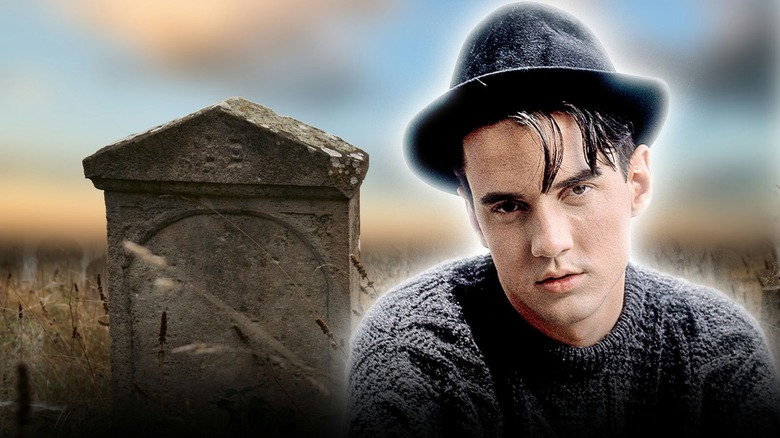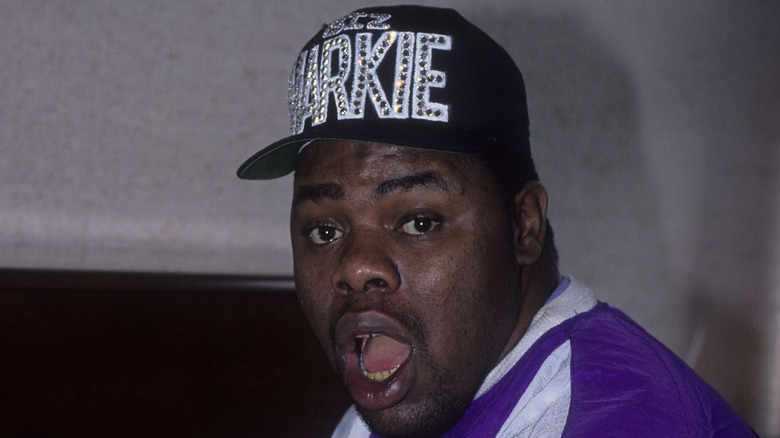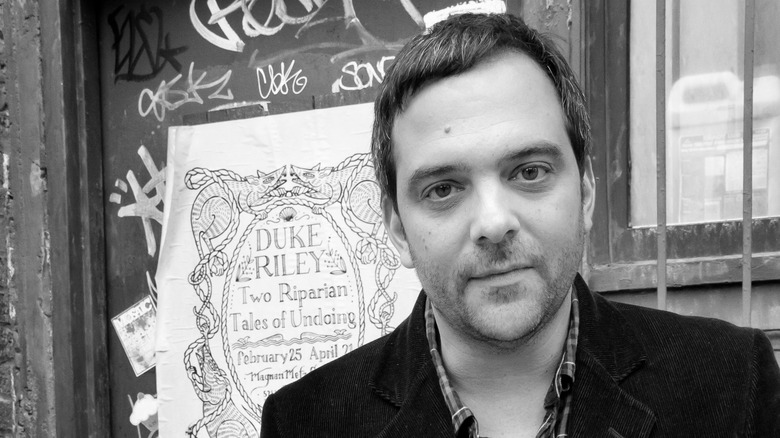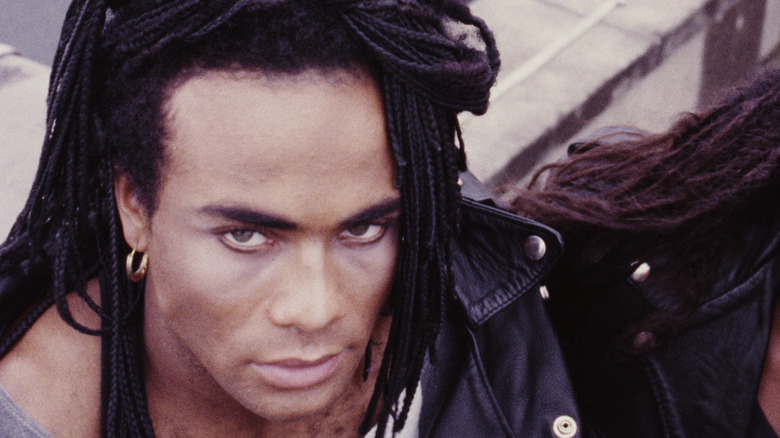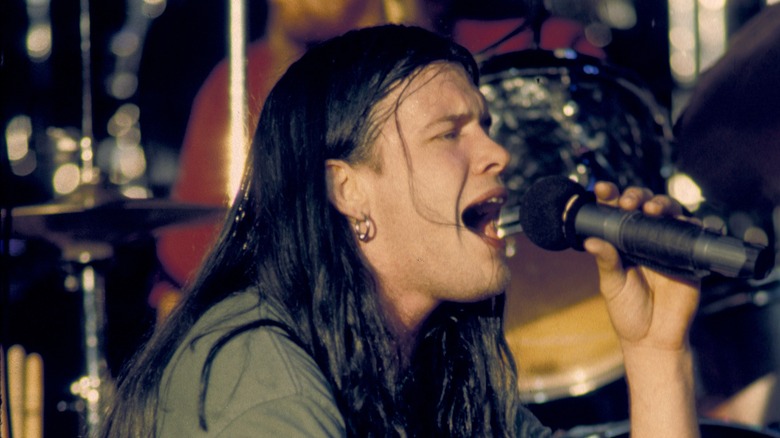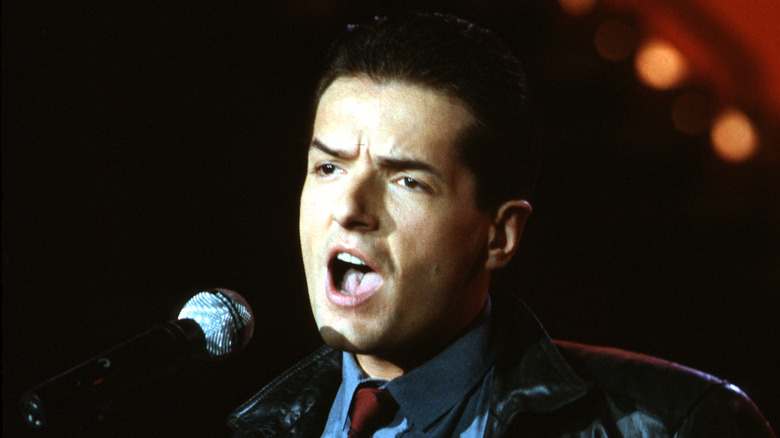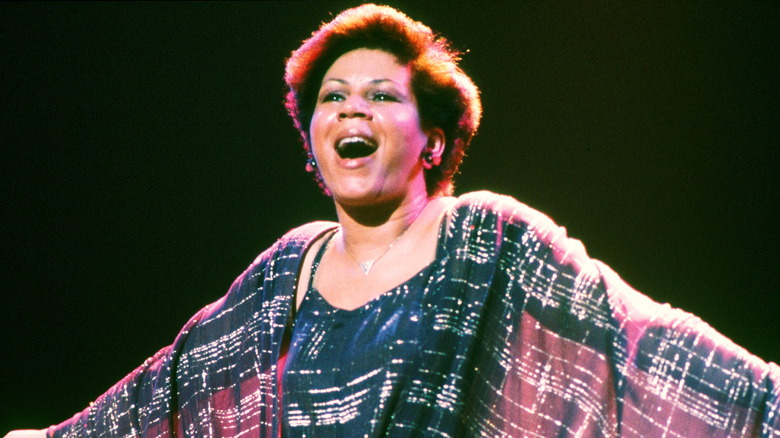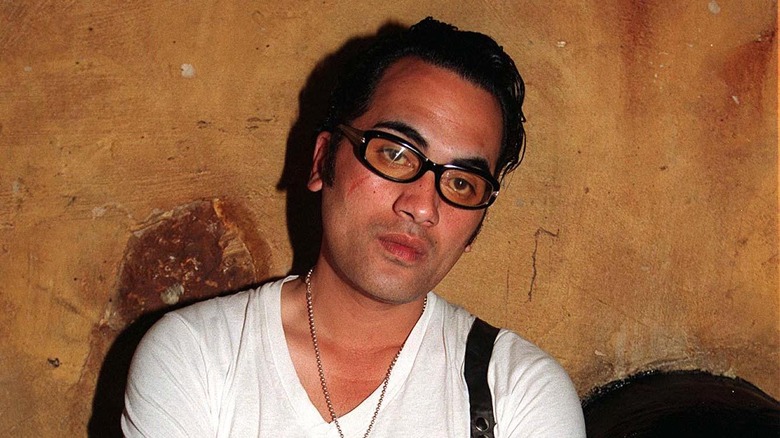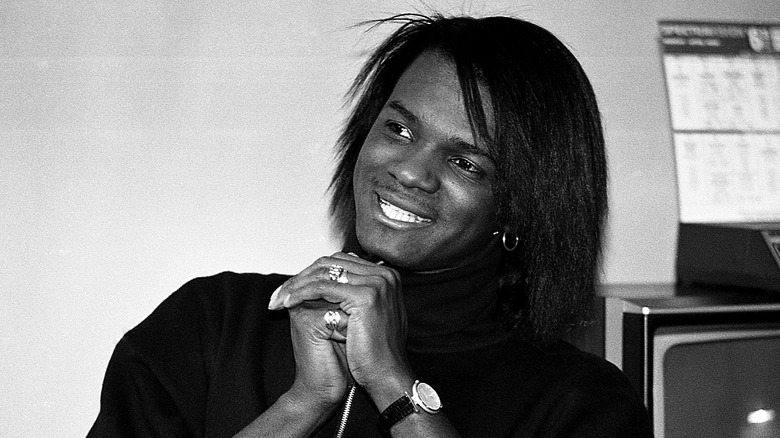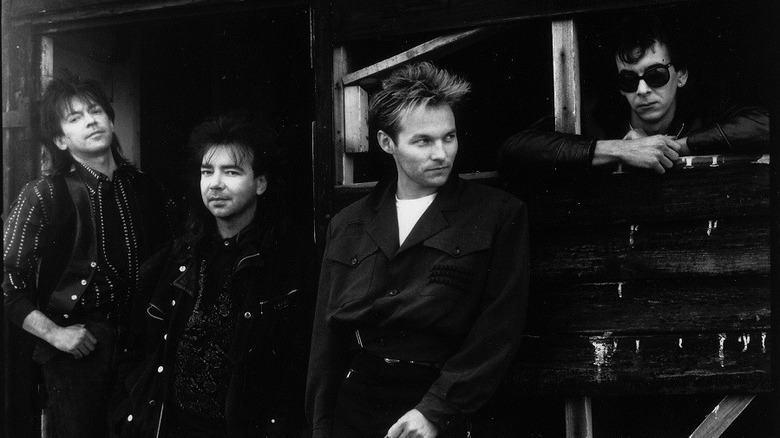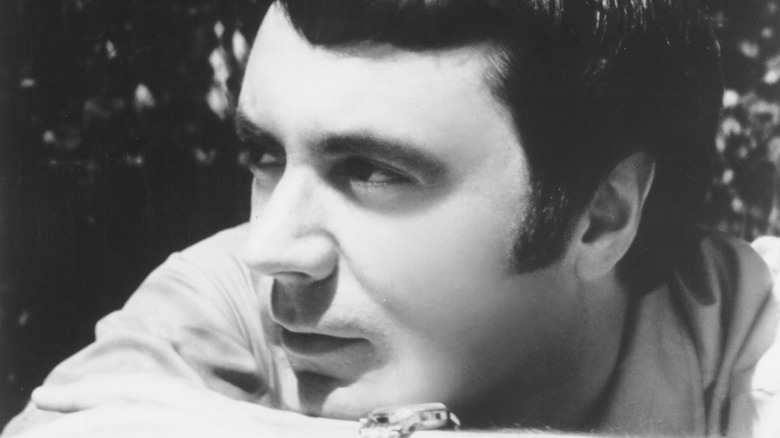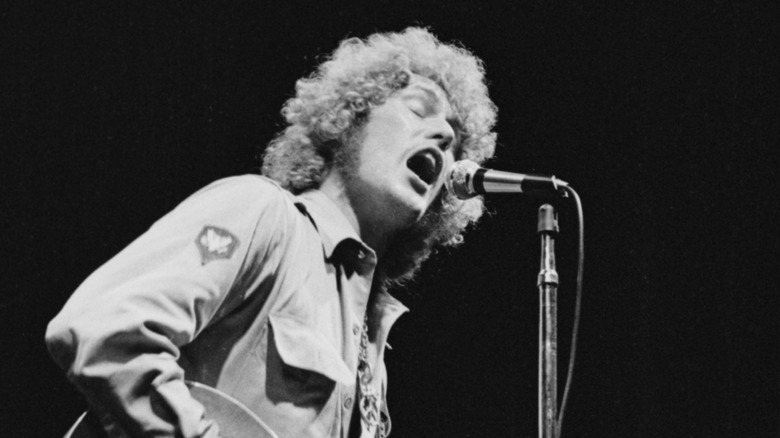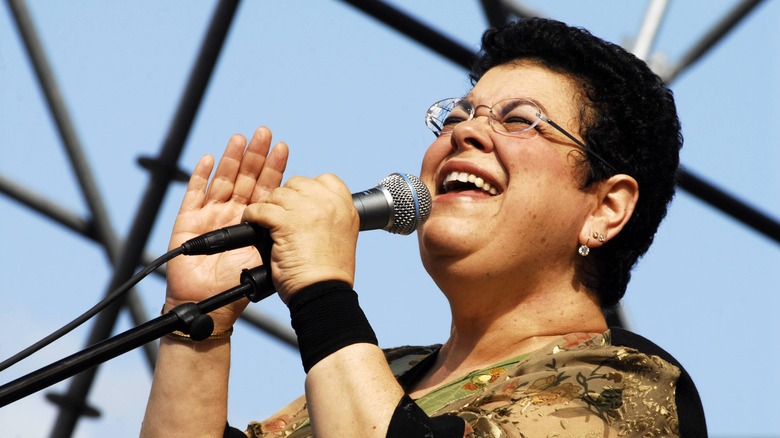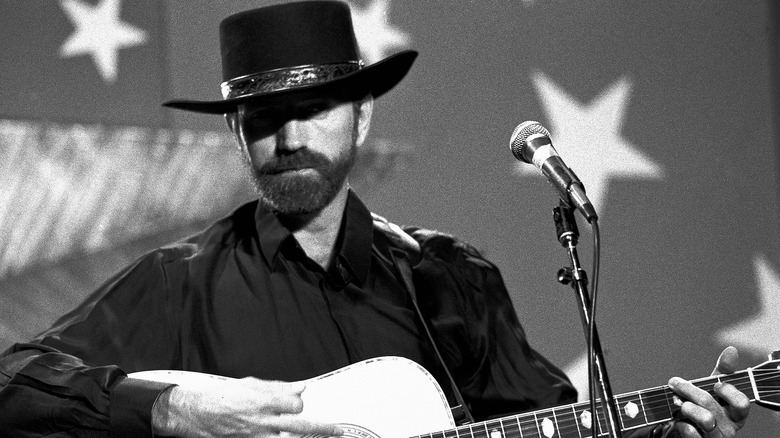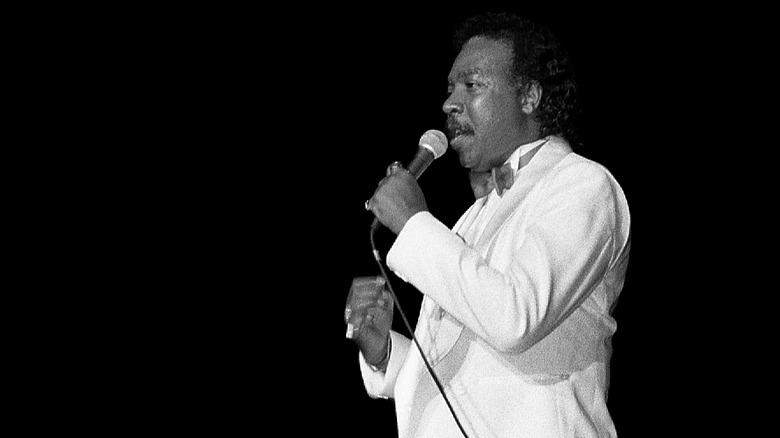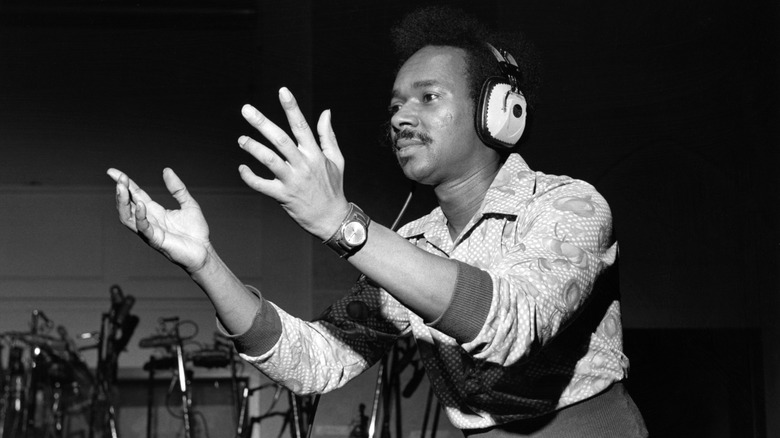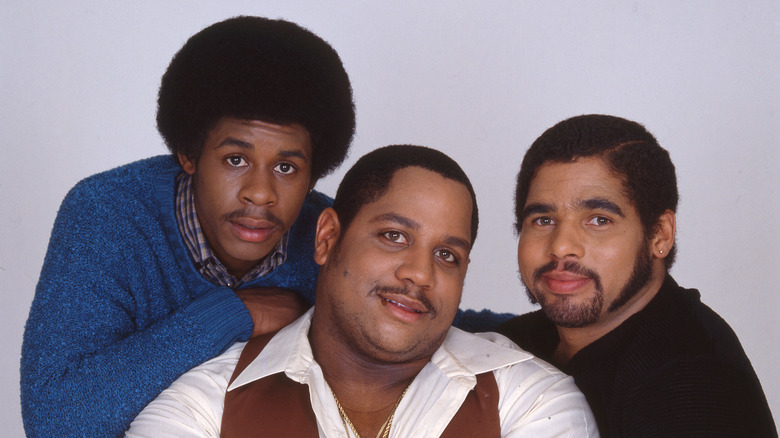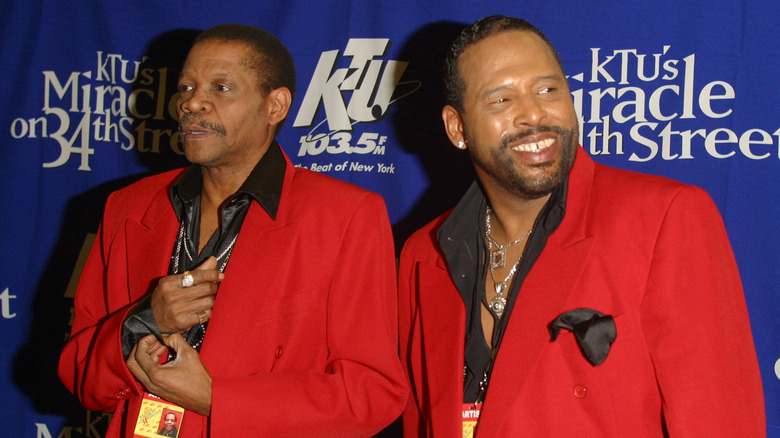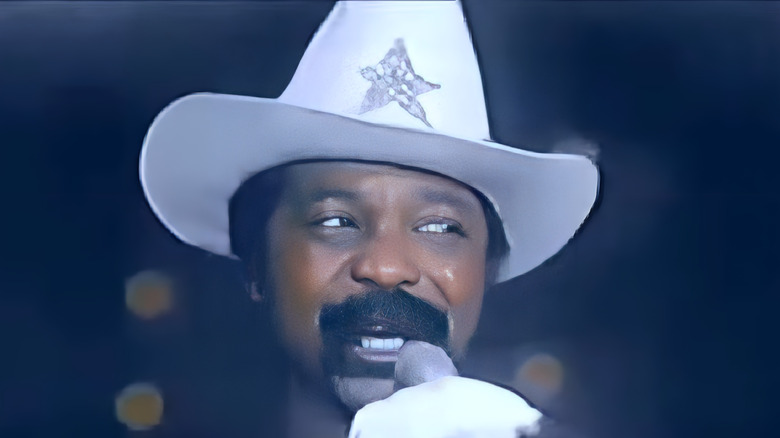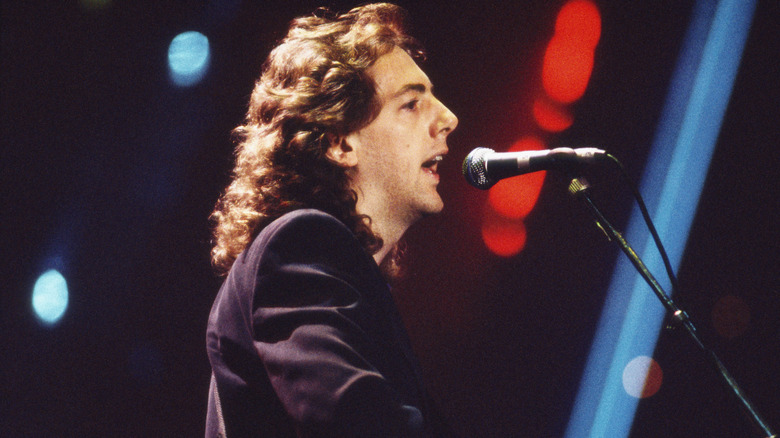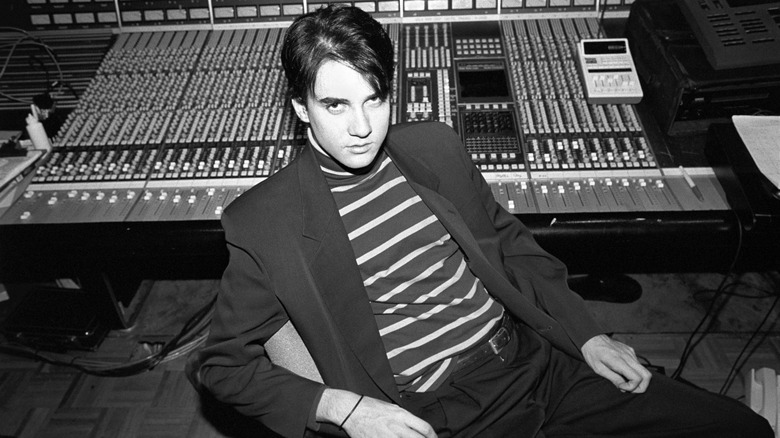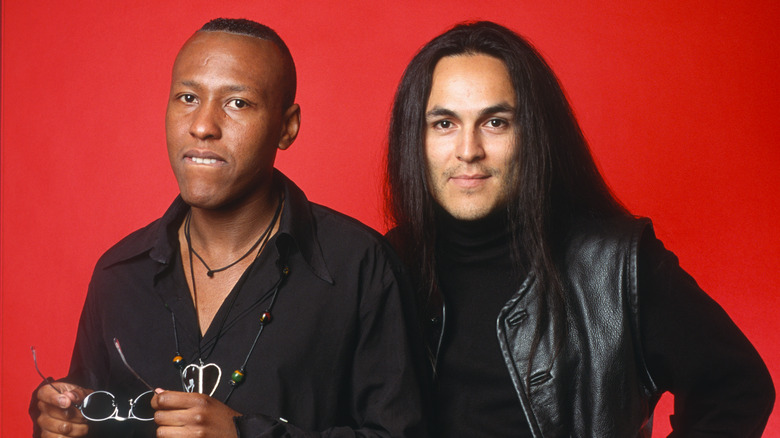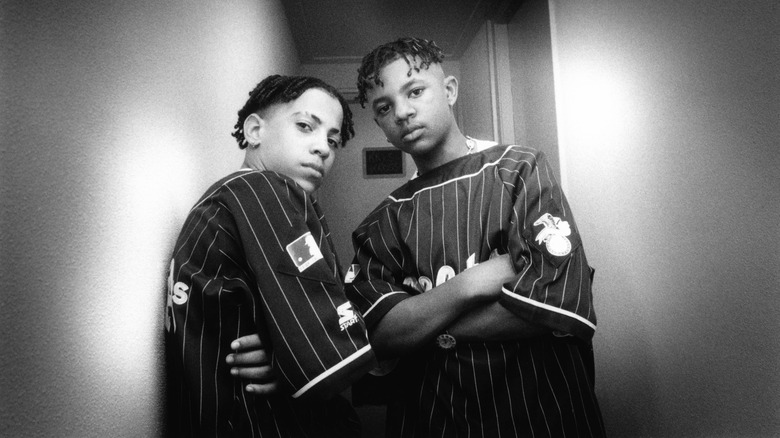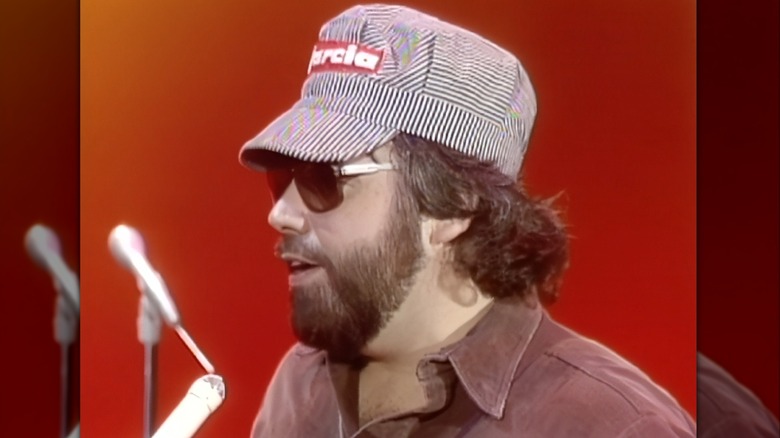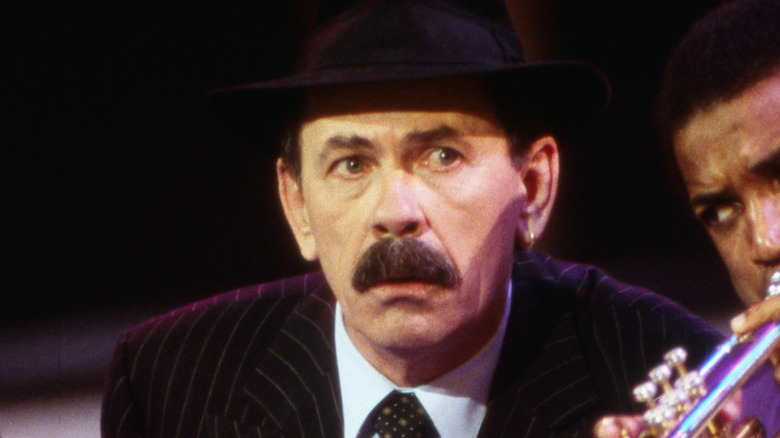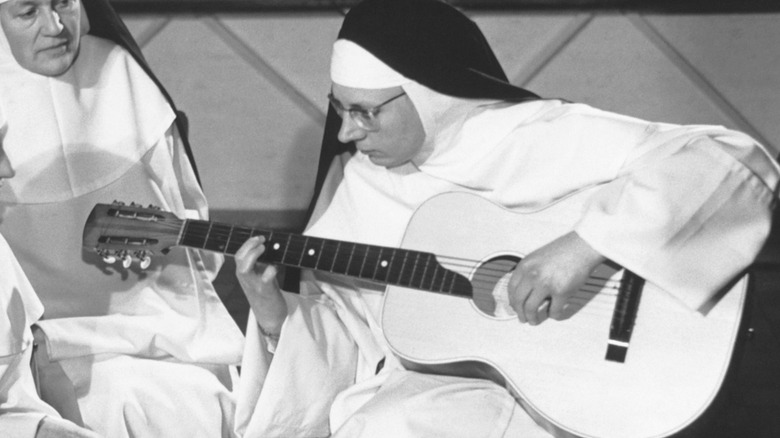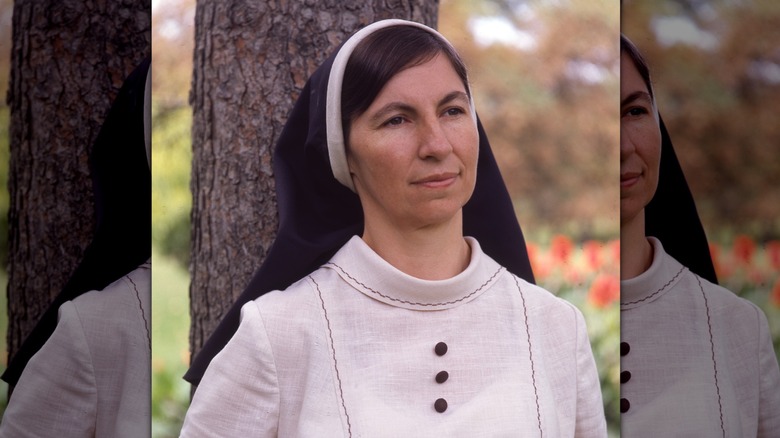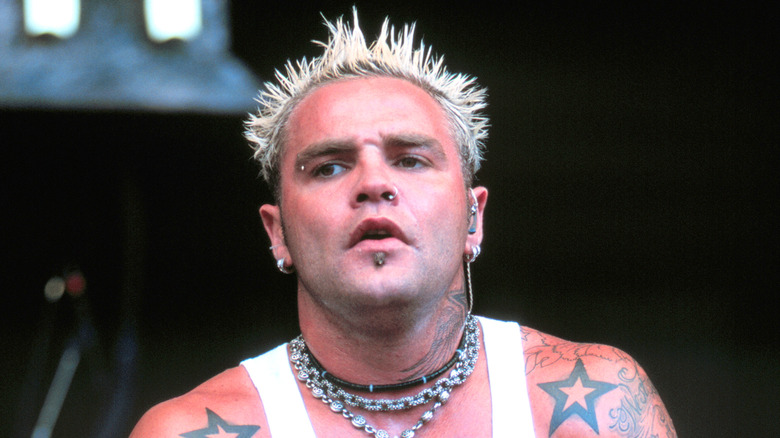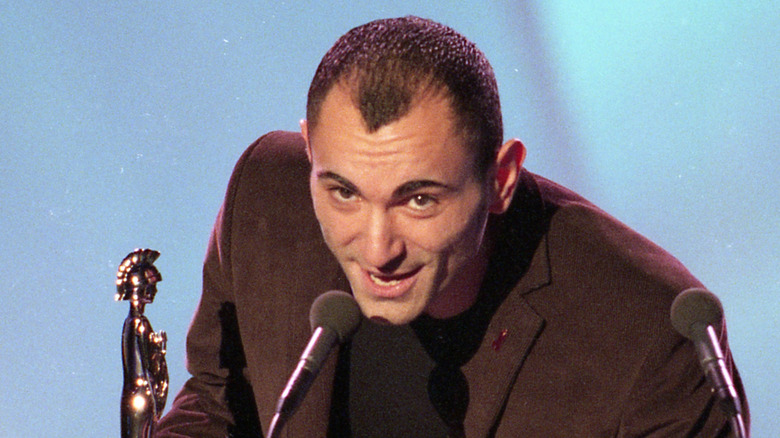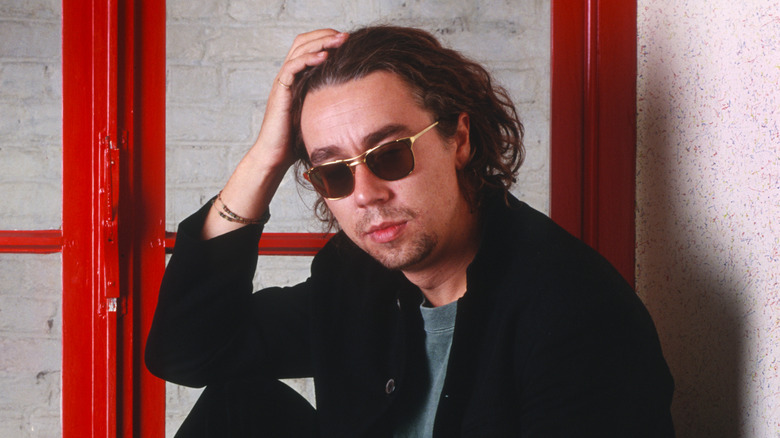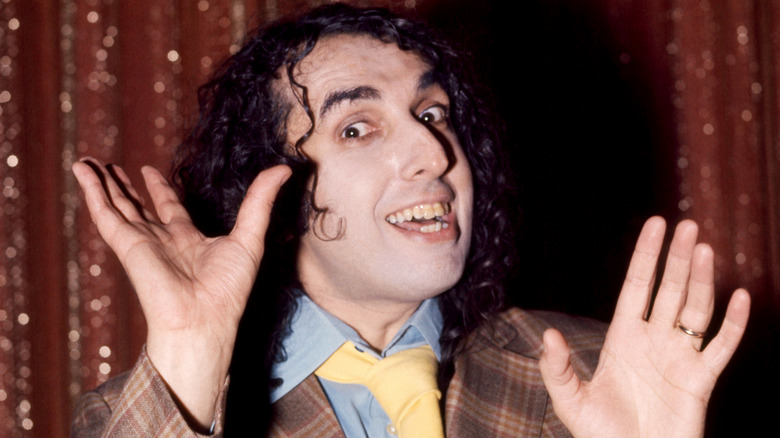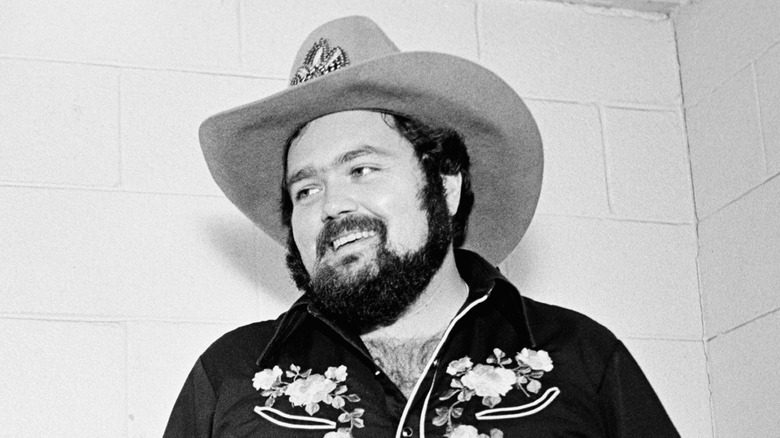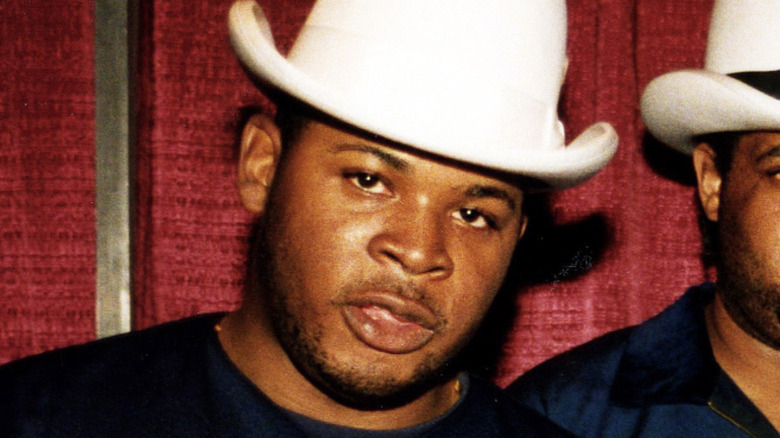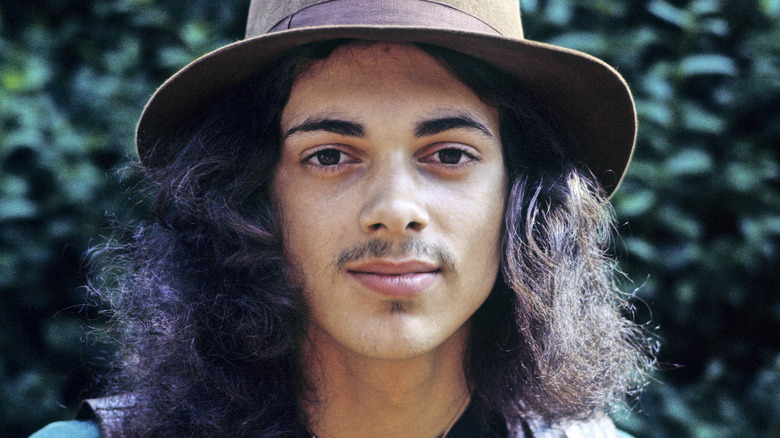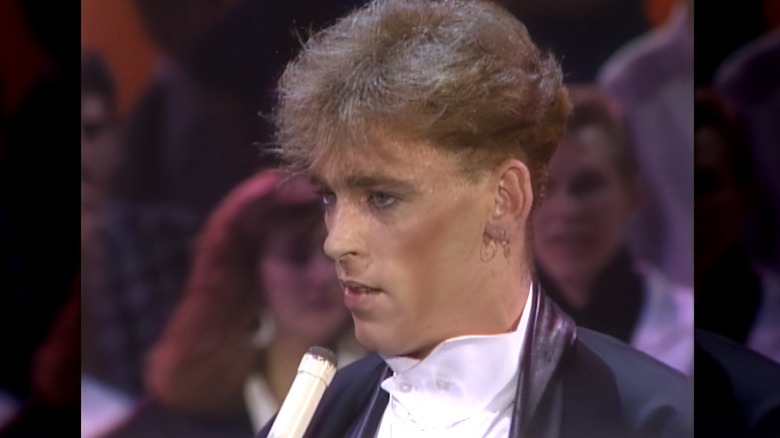One-Hit Wonders You Didn't Know Passed Away
It feels wrong to call most of the folks on this list one-hit wonders because the term gives the illusion that these musicians materialized out of nowhere, exploded onto the airwaves, and then disappeared into dust. In reality, the majority of these acts were well respected in their profession for years before and after becoming a household name. For some of the less-seasoned singers and songwriters, their fame came too soon, upending the potential trajectory of their careers and ending in the many tragic stories of one-hit wonders.
Another reason it is difficult to call these artists one-hit wonders is because many of them created songs that could be considered hits in their home or other countries, but that never made it to the U.S. charts. Plenty of these singer-songwriters released tracks that the majority of their fans loved and would consider hits. A lot of one-hit wonders made a lot of wonderful music, but are only remembered by the majority of the U.S. for one true hit. A few on this list may have had more than one hit, if only they had lived long enough to do it, but all still gave us one song that lasted into the cultural firmament before they died.
Biz Markie
In 2020, the world lost one of the biggest one-hit wonders of all time, Biz Markie. His song "Just a Friend" peaked at No. 9 on Billboard in 1990, and stayed on the charts for 22 weeks. The song is a rap by Markie mixed with some of the beat and lyrics of the 1968 song "(You) Got What I Need" by Freddie Scott. It went platinum in the year of its release.
Biz Markie was born Marcel Theo Hall in Harlem, New York, in 1964. Markie gained a reputation as a beatboxer in 1985, and came up alongside famous rappers such as Doug E. Fresh and often worked with Big Daddy Kane. His hip-hop talents, mixed with his humorous lyrics, earned him the title the Clown Prince of Hip Hop. Markie released a few more albums after the success of "Just a Friend," and continued to perform for decades, but he never entered the charts again.
The rapper's health took a downturn starting in April 2020. He died July 16, 2021, in Baltimore, Maryland, at just 57 years old. Markie's cause of death is unconfirmed, but he was known to have struggled with Type 2 diabetes.
M-Bone and JayAre
In 2010, Cali Swag District's first single, "Teach Me How to Dougie," became a national dance sensation. Michelle Obama could be found doing the Dougie at her "Let's Move!" events and on "Late Night with Jimmy Fallon." The Dougie was inspired by the dance moves of 1980s hip-hop artist, Doug E. Fresh. Doug E. Fresh said that the song allowed people to "get back to what hip-hop was about, which is about having fun."
In May 2011, one of the members of Cali Swag District, Montae "M-Bone" Talbert, was murdered in Inglewood, California, in a drive-by shooting; Talbert was only 22 years old. After his death, the remaining three members continued, later releasing the album "The Kickback."
In 2014, the group lost a second member, Cahron "JayAre" Childs. He had sickle cell anemia and died of a cardiac arrest after being admitted to a hospital. He was 25 years old. The group had just released a mixtape with a Nipsey Hussle collaboration, but following these two tragedies, Cali Swag District dissolved.
Adam Schlesinger
Adam Schlesinger formed Fountains of Wayne with Chris Collingwood in the mid-'90s. The band didn't have a hit until 2003, when it released the song, "Stacy's Mom." Schlesinger and Collingwood wrote the song based on a friend of Schlesinger's who was attracted to his grandma. It was an ode to early puberty. Schlesinger told MTV (via UDiscoverMusic.com), "It's a combination of sexual awakening and limited contact with a large number of people." The song earned them a Grammy Nomination for Best Vocal Performance and Best New Artist.
Adam Schlesinger was a talented writer and musician who wrote a lot of music for television in addition to his Fountains of Wayne success. He won a Grammy for "A Colbert Christmas: The Greatest Gift of All!" He won three Emmys, one for his work on "Crazy Ex-Girlfriend," and two for co-writing for the Tony Awards telecast. He was nominated for an Oscar for the title track in "That Thing You Do!" On April 1, 2020, it was announced that Schlesinger had died from complications caused by COVID-19. He was 52 years old.
Melanie Thornton
Melanie Thornton was one half of the Euro-pop group La Bouche (French for "mouth"), along with singer Lane McCray. La Bouche was created by German producer Frank Farian, who also worked with Boney M and Milli Vanilli. In 1995, the group hit the Billboard charts with its song "Be My Lover."
Thornton grew up in Charleston, South Carolina, where she started singing in her childhood, usually along to her mother's Motown classics. She moved to Germany in 1992, and a few years later formed LaBouche with McCray. While "Be My Lover" is the song the band is best known for, La Bouche had other popular songs within the dance music scene. Thornton decided to leave the group in 2000 to produce a solo album. While promoting that album, she died in a plane crash at just 34 years old. After her death, her song "Wonderful Dream" was used in a Coca-Cola commercial, as had been planned before her fateful crash.
Rob Pilatus
Rob Pilatus was one half of the infamous duo Milli Vanilli, along with Fab Morvan. The act rose to fame with the hit song "Girl You Know It's True" in 1989. That same year, while performing a concert in Connecticut, the song that they were mouthing along to skipped. Pilatus told the Los Angeles Times (via Biography), "I knew right then and there, it was the beginning of the end for Milli Vanilli." It took the rest of the world a bit longer, but a year later, it became a widely known scandal that Milli Vanilli was lip-syncing and not the true artists behind the hit.
"Girl You Know It's True" was not even a new song. It was first released by the band Numarx. Music producer Frank Farian reportedly heard the track and knew he could make it better. He remixed the song with new vocals and hired Pilatus and Morvan to be the frontmen. According to Billboard, Numarx member Ky Adeyemo, said, "All Frank did was take the back hook ["Girl you know it's true, my love ... ooh ooh ooh I love you"] and put it with the other hook and the rest is music history."
When the news broke that the performers were not the same artists who recorded their album, Pilatus and Morvan were stripped of their Grammys and ostracized. Though the two tried to make a comeback on an album of their own, they were never able to reach the level of success made with Milli Vanilli. Rob Pilatus tragically died in 1998 of a suspected drug overdose. He was just 33 years old.
Shannon Hoon
Shannon Hoon was the long-haired, 20-something lead singer for the band Blind Melon. The group's hit song, "No Rain," invaded the public's consciousness in 1993. Released in MTV's glory days, lots of people remember it from watching the music video. It featured a young girl tap dancing in a bee costume on stage and then wandering around Los Angeles looking for applause, until she finds a field full of bee people just like her. (The "bee girl" later paid tribute to the "No Rain" video on her wedding day.)
Hoon was born in Lafayette, Indiana — the same hometown as Axl Rose — in 1967. The Blind Melon frontman sang backing vocals on several Guns N' Roses tracks, and also shared lead vocals with Rose on the song, "Don't Cry." At the same time, Hoon was working with Blind Melon, which formed in 1990.
In 1995, Hoon was found dead from a cocaine overdose on his tour bus in New Orleans. His daughter, Nico Blue, had been born only three months prior. Blind Melon had just released its second album, "Soup," and Hoon had turned 28 just a month before.
Falco
Johann "Hans" Holzel went by the stage name Falco, and his song "Rock Me Amadeus" hit No. 1 on the Billboard charts in 1986. While only known for "Rock Me Amadeus" in the U.S., Holzel's 1982 debut hit "Der Kommissar" hit the European charts when he was only 25 years old. According to Der Spiegel, Holzel was philosophical about his fame. He said, "Today platinum, tomorrow tin, today they kiss your feet and tomorrow the dog won't even look at you."
Technically, "Rock Me Amadeus" is a rap song, meaning that the Austrian singer holds the distinct recognition of being the first rap artist to reach No. 1 on the U.S. charts. While Falco never had another hit at the same level, he did sell 60 million records over the course of his career.
While vacationing in the Dominican Republic in 1988, a car Holzel was driving was tragically hit by a truck. He died at age 40. While he was not widely known in the U.S., for Austrians, he was bigger than Mozart.
Doug Fieger
Doug Fieger was the lead singer of the band the Knack, whose hit "My Sharona" was No. 1 in the summer of 1979. The song gained attention again in 1994, when it was part of the film Reality Bites's soundtrack, and was written for Fieger's crush, Sharona Alperin, with whom he went on to have a relationship. While the two did date, they never married, but remained friends. In an interview for Variety, Alperin said the song took Fieger less than 15 minutes to write.
Fieger was born in Detroit in 1952, and grew up in Oak Park, Michigan. Before graduating high school, his band Sky signed to RCA. Sky recorded two albums, but then the band dissolved. In 1978, Fieger created the Knack. After the success of its debut album and the hit "My Sharona," the Knack went on to release a few more albums, but never again reached the success of its first run. In 2010, Fieger died of lung cancer, aged 57.
Pete Burns
Pete Burns was the lead singer of the band Dead or Alive, whose song "You Spin Me Right Round" reached the Billboard Top 20 in 1985. The song was produced by S.A.W., a trio that went on to create other hits, such as Rick Astley's "Never Gonna Give You Up."
Burns was born in Cheshire, England in 1959. His father was English, and his mother, who was German, had survived the Holocaust. He dropped out of school at age 14 and had formed the band Dead or Alive by 1980. Famous for his androgynous image, he also accused Boy George of stealing his style.
Dead or Alive recorded several albums but never again achieved the same level of success as with "You Spin Me Right Round." Despite weathering tragic twists in his life, Burns remained in the limelight by appearing on reality shows, including "Big Brother" and "Celebrity Wife Swap," and was a well-known figure in the U.K. Burns died of a cardiac arrest in 2016. He was 57 years old.
Minnie Riperton
Minnie Riperton is most famous for her song "Lovin' You," which was released in 1974. The song is a high-pitched lullaby that was originally created for Riperton's daughter, Maya Rudolph; yes, the well-known comedian from "Saturday Night Live" and "Bridesmaids" and the voice of many mom characters in kid's movies. "Lovin' You" has been featured in commercials for large companies such as Burger King and Visa. It has also been used in films such as "Vegas Vacation" and "The Nutty Professor."
Riperton was born in Chicago in 1947. Before graduating high school, she joined a band called the Gems, which signed with Chess. She also performed backup vocals for the Dells and Etta James. In the late '60s, she partnered with her husband, Richard Rudolph, a prolific composer.
Because she had worked as a backup singer for Stevie Wonder, the legendary musician agreed to help her produce her album, "Perfect Angel," which featured the song "Lovin' You." Riperton's fame grew slowly, but soon she was appearing on "American Bandstand" and "Soul Train." Just as she was offered the opportunity to release another album, she was diagnosed with breast cancer. She continued to perform for live audiences until her death in 1979, aged just 31.
Stuart Adamson
Stuart Adamson was the lead singer of the band Big Country, best known for its hit song, "In a Big Country." The song made it to the U.S. Billboard charts in 1983. Talking to Melody Maker (via Songfacts), Adamson said of the song, "The lyrical idea was about having hope, a sense of self in times of trouble." Big Country was nominated for two Grammys, for Best New Artist and for Best Rock Performance by a duo or group for their song "In A Big Country."
Born in 1958 in Manchester, England, but raised in Dunfermline, Scotland, Adamson began singing in the punk band the Skids in his teens. He formed Big Country in the 1980s, and for a time it rivaled U2 as Celtic superstars. Big Country continued to make records and perform until 2000, when Adamson decided to leave the group. It never had another hit in the U.S.
Adamson moved to Nashville to start an alternative country band called the Raphaels. In 2001, it was reported that Adamson had died by suicide in Honolulu, Hawaii. He was 43 years old.
Pauly Fuemana
Pauly Fuemana was the lead singer of OMC, whose song "How Bizarre" was No. 1 on the U.S. Billboard Charts in 1997, and stayed on the charts for 32 weeks. OMC stood for Otara Millionaires Club, in homage to the neighborhood where Fuemana grew up in Auckland, New Zealand. Otara was one of New Zealand's poorest communities, hence the irony of the name.
Fuemara was born to a Maori mother and a Niuean father and spoke Niuean first. He reportedly had a rough childhood, joining gangs and later spending time in a youth prison. Then, success came at him fast, and he did not handle it well. He was sued by his producer Alan Jansson for royalties and by 2006 had declared bankruptcy. Fuemana continued to work at building his music career, but never reached the success of "How Bizarre" again. In 2010, Fuemana died of a rare autoimmune disorder. He was 40 years old, and left behind his wife and six children.
Natina Reed
Natina Reed was a singer in the trio Blaque, which became well-known in 1999 for its hit "Bring It All To Me." The girl group was discovered and mentored by Lisa "Left Eye" Lopes of TLC. Reed and the other two members, Brandi Williams and Shamari DeVoe, also had minor roles in the film "Bring it On" in 2000.
From the time Reed was 8 years old, she was in entertainment, and began as a model for Macy's and Bloomingdales. Blaque formed in 1996, when the girls were still in high school. After their debut's major success, the trio released a few more studio albums but never had another hit. In 2012, just as Reed was planning a comeback, she was hit by a car while crossing a street in Atlanta. She was 31 years old, and a mother to a 10-year-old son.
Chrissy Amphlett
Chrissy Amphlett was the lead singer of the Australian rock band the Divinyls, best known for its 1991 hit song "I Touch Myself." The song was a collaboration between the band and songwriters Tom Kelly and Billy Steinberg, who are famous for hits including Madonna's "Like a Virgin" and "True Colors." The music video for the song was directed by none other than Michael Bay. While the band released seven albums between 1983 and 1996, none of its songs reached the same level of success as "I Touch Myself."
Amphlett was born in 1959 in Geelong, Victoria, Australia. She formed the Divinyls in 1980. Along with singing and songwriting, Amphlett was an actress, appearing in an Australian film called "Monkey Grip" and a stage production of "Blood Brothers." In the late '90s, Amphlett left the band to pursue acting further. She was diagnosed with multiple sclerosis in 2006, and breast cancer in 2010. Fittingly, the song "I Touch Myself" has been used in a campaign to educate women about breast cancer. In 2013, Amphlett died of breast cancer. She was 53 years old.
Jermaine Stewart
R&B singer Jermaine Stewart's hit song "We Don't Have to Take Our Clothes Off" reached No. 5 on the Billboard 100 charts in 1986. The song has popped up on the soundtracks for the film "Zack and Miri Make a Porno" and TV shows such as "Scrubs" and "Superstore." Stewart started off as a dancer on "Soul Train" and moved on to be a backup singer for large acts such as Shalamar and Boy George. He landed a deal with Arista records, and released four albums, with "We Don't Have to Take Our Clothes Off" his biggest success.
Stewart was born in Columbus, Ohio, but his family moved to Chicago when he was still young. He died in 1997 of liver cancer caused by AIDS, according to a book written by AIDS advocate Dr. Terri Easley. He was only 39 years old. Stewart was buried in an unmarked grave for 17 years.
Mark Hollis
Not to be confused with the Bon Jovi song released in 2000, "It's My Life" was written and sung by Mark Hollis in 1983. While No Doubt covered it in 2003, "It's My Life" initially entered the charts in 1984, and it was the first and last hit for the band Talk Talk. The band was formed in 1981 in London by Hollis. Shortly after, it signed with EMI and began touring with Duran Duran. After the success of "It's My Life," the band decided to change its sound, which made them less commercial, but nevertheless, they continued to work together until they released their final album in 1991.
Hollis was born in Tottenham, London, in 1955. He was heavily influenced by his older brother, Ed, who was a music producer. After Talk Talk released its last album, Hollis dropped out of public life to focus on his family. He later released a solo album and was commissioned to do the music for the TV show "Boss" in 2012, but other than that, he flew under the radar until his death in 2019. Per NPR, Hollis's manager stated: "[the musician died] due to a short illness from which he never recovered." The style and genius of Mark Hollis has been credited as the inspiration for many bands, including Radiohead.
Kevin MacMichael
"(I Just) Died in Your Arms" was a No. 1 Billboard hit in 1987 for the band Cutting Crew. Kevin MacMichael was not the singer, but the lead guitarist and writer for the group. "(I Just) Died in Your Arms" earned the band a Grammy nomination for Best New Artist, and Cutting Crew released a few more albums after its debut success, but failed to enter the charts again. The band ultimately disbanded in 1993.
MacMichael was born in New Brunswick, Canada, in 1951. MacMichael started playing guitar in high school, and learned hundreds of Beatles songs. He formed Cutting Crew with Nick Van Eede, the band's lead singer, in 1985. When MacMichael left the group, he went to work with Robert Plant as a guitarist and writer. In 2002, MacMichael was diagnosed with lung cancer. He died later that year, at the age of 51.
Dan Hartman
It's hard to call Dan Hartman a one-hit wonder, because he wrote many great songs, but he is only known for singing one. Aside from writing and performing, "I Can Dream About You," which peaked at No. 6 in 1984, he wrote and produced James Brown's "Living in America," which made it to No. 4. Hartman also wrote "Living in America" for "Rocky IV," which earned Hartman a Grammy nomination.
"I Can Dream About You" was initially written for the film "Streets of Fire." It was sung by a fictional group, the Sorels, and the vocals were provided by Winston Ford. It is Hartman's voice on the soundtrack and the single released that same year.
Hartman was born in Harrisburg, Pennsylvania in 1950. He began playing piano at age 7 and by 13 was writing songs for his brother's band, the Legends. Dan worked with the Edgar Winter Group in the '70s, until he broke out with his first solo album in 1976. While his music did well in the U.K., it was not until "I Can Dream About You" that he reached the U.S. charts. Though he continued to write and produce, nothing else he released had the same success. Hartman died in 1994 from a brain tumor considered related to his AIDS diagnosis.
R. Dean Taylor
While he only scored one hit tune of his own — "Indiana Wants Me," a No. 5 single in 1970 — Toronto native R. Dean Taylor was responsible for a slew of others.
When the hit-making songwriting team of Brian Holland, Lamont Dozier, and Eddie Holland left Motown records in 1968, Taylor was one of a new team who attempted to keep the magic going. Faced with the daunting task of coming up with a new song for the Supremes and given only about a week to do so, he and fellow songwriter Pam Sawyer penned the smash hit "Love Child," the first of two top-10 hits he would have a hand in writing for the iconic girl group.
"Indiana Wants Me," about an outlaw on the run, was typical of Taylor's work as a songwriter: dark and cinematic, with a strong narrative informed by its framing as a letter to a lover the poor guy knows he'll never see again. Speaking with the Toronto Star, Taylor's wife Janee said, "He wrote dark songs ... He wrote about things that were troubling people in life." She went on to explain that after a move to Los Angeles, Taylor dabbled with the formation of his own labels and production companies, none of which ever bore any fruit, which caused him to become a touch disillusioned. Taylor died in January 2022, roughly a year after a bout with COVID-19 from which he had never fully recovered.
Alvin Lee
British blues rockers Ten Years After had a pretty decent run of success in the late '60s and early '70s, notching five top-40 albums and a lone hit single, "I'd Love to Change the World," which just cracked the Top 40 in 1971. It may be that none of this success would have come their way if not for a few minutes that shook the guitar world: a sizzling, dizzying solo by singer and guitarist Alvin Lee, who peeled off said solo in the middle of an eleven-minute rendition of "I'm Going Home" at Woodstock, a performance that was captured for posterity in the legendary documentary film of the same name. Lee's inspired performance was a highlight of a festival that was full of those, and it's safe to say that the appearance raised his band's profile considerably.
Lee remained active as a musician up until the end of his life, landing no fewer than seven solo albums on the Billboard chart and releasing his final effort, "Still On the Road to Freedom," just a year before his death. The guitarist died in 2013 at the age of 68, after complications arose during a surgery that was described as routine. In a statement, his wife and daughters described him as "a truly great and talented musician," while his bandmate Leo Lyons, speaking with Billboard, called him "an inspiration for a generation of guitar players."
Phoebe Snow
Singer, songwriter, and guitarist Phoebe Snow's career might have gone very differently had fate not intervened. With a songwriting talent to match her formidable vocal chops, she debuted in 1974 with her self-titled debut album, which peaked at No. 4 on the Billboard chart and yielded a single, "Poetry Man," which went to No. 5 in 1975. It was during this period, while enjoying the view from the top of the charts, that her daughter Valerie was born with severe brain damage that left her disabled for her entire life.
Rather than institutionalize her daughter, Snow vastly scaled back her career ambitions to care for her by herself at home. In a 2008 interview with the San Francisco Chronicle (via Billboard), the singer said, "Occasionally I put an album out, but I didn't like to tour, and they didn't get a lot of label support. But you know what? It didn't really matter, because I got to stay home more with Valerie, and that time was precious."
Indeed, Snow's noble decision seemed to have made all the difference in the world: Valerie, who wasn't expected to live more than a handful of years, died in 2007 at the age of 31. Snow helped to pay the bills by singing commercial jingles and TV themes (including the theme for the "Cosby Show" spin-off "A Different World"), but peers were well aware of her greatness; she sang backup for Paul Simon, and performed with the likes of Thelma Houston, Michael McDonald, and Boz Scaggs throughout the years. After a brain hemorrhage in 2010, she died in April 2011.
Sammy Johns
A musician since his youth, singer, songwriter, and guitarist Sammy Johns may not be a household name, but if you're a fan of country music, you are likely familiar with his work. His lone chart success was "Chevy Van," an ode to teen vehicular lovin' that went to No. 5 in 1975.
The single helped to spark something of a van craze, and the following year, he was enlisted to work on the soundtrack to the 1977 teen comedy "The Van," a little-remembered non-classic that happened to be among the first feature films to star future comedy legend Danny DeVito. Understandably unable to ride this somewhat niche career path to continued mainstream success, Johns continued to write tunes, and in the early '80s, his song "Common Man" became a smash for country artist John Conlee.
Over the years, Johns would pen songs for many country legends, including Conway Twitty and Waylon Jennings, whose "America" was written by Johns, and who serenaded the Statue of Liberty with it in 1985 on the occasion of the landmark's restoration. While he never again sniffed success as a recording artist, Johns was able to enjoy a lifelong career in the music industry, which he characterized as "painful at times, but never boring" in a 2000 sit-down with The Charlotte Observer. Johns also had marital problems and drug and alcohol issues, which evidently took their toll; he died at the age of 66 in 2013.
Major Harris
While Stax and Motown were blasting their way onto the national music scene with their rollicking, punchy brands of R&B in the late '60s, a few visionary groups out of Philadelphia were taking a different approach. Favoring smooth harmonies and silky strings instead of emphatic vocals and blaring horn sections, these groups won over a large segment of the R&B audience with their "Philly Sound." This was exemplified by such classic tunes as "La-la (Means I Love You)" and "Didn't I (Blow Your Mind This Time)," both by The Delfonics, which was among the first purveyors of this smoother style.
Vocalist Major Harris was a relative latecomer to the group, replacing the departed Randy Cain in 1971. After a three-year run, Harris himself departed in 1975 to pursue a solo career, which may have been the final nail in the coffin of The Delfonics. However, Harris enjoyed near-immediate success with "Love Won't Let Me Wait," a No. 5 hit in 1975. Unfortunately, he failed to come within shouting distance of that success again, but his lone hit proved to have an enviable shelf life, spawning covers by Johnny Mathis with Deniece Williams, Luther Vandross, and Seal. In 2011, Harris got together with a few of his old bandmates in The Delfonics; the following year, he died of congestive heart failure at the age of 65.
Van McCoy
Singer, songwriter, and producer Van McCoy would have had an enviable career had he never even had a single design on becoming a performer. Often working with fellow songwriters Charles Kipps and sometime girlfriend Kendra Spotswood, he wrote or co-wrote such iconic tunes as "I Get the Sweetest Feeling," a No. 34 hit for Jackie Wilson; "Giving Up, " which cracked the Top 40 for Gladys Knight and the Pips; and "Baby I'm Yours," a No. 11 smash for Barbara Lewis. McCoy, though, wanted more — and throughout the '70s, he repeatedly tried to make an impact as a solo artist, releasing a series of LPs that failed to gain any traction.
Seeking to capitalize on the disco craze, McCoy put together some new tracks for the 1975 LP "Disco Baby," the last of which to be recorded was a lively tune anchored by an earworm-y flute riff, inspired by a dance that had been described to him by New York DJ and producer David Todd. The name of that dance was the Latin Hustle, and McCoy was moved by his conversation with Todd to cut "The Hustle," a smash hit that spent 15 weeks on the Billboard Hot 100 and peaked in the very top spot. After failing to grab lightning in a bottle again with several follow-up LPs, McCoy briefly returned to producing, but he tragically had a heart attack and died in 1979.
Bobby Caldwell
Bobby Caldwell has always commanded the respect of R&B aficionados; his undeniably smooth, textured voice is of the variety that should have anchored dozens of hit records. Instead, somehow, it graced only one: "What You Won't Do For Love," a No. 9 hit in 1978.
In a 2005 interview with NPR, it was pointed out by interviewer Ed Gordon that during the '60s and even '70s, many record labels would not picture Black artists on their record covers, for fear that white audiences wouldn't buy their music. For Caldwell, however, it was the opposite, as his label was depending on the support of Black radio to launch his career. "[My label] really didn't want it to be well-known that I was white," Caldwell explained. "Today, as we speak, there are still a few holdovers that don't know that."
Caldwell was active in the music business both before and after his brush with top-10 success, starting out as a guitarist for the legendary Little Richard, and penning tunes later in his career for the likes of Peter Cetera, Boz Scaggs, and Neil Diamond. His signature tune has been covered dozens of times, and even sampled by Tupac for "Do For Love," a posthumous No. 21 hit for the rapper. Caldwell's final album, the brilliantly titled "Cool Uncle," was released in 2015. In March 2023, Calwell died at his home at the age of 71, after years of health issues.
Henry Lee Jackson
Considering its status as a beloved touchstone of pop music and popular culture in general, it's tough to overstate just what an extreme outlier the Sugarhill Gang's immortal "Rapper's Delight" was when it hit the airwaves in late 1979.
The song was a top-40 pop single that was about 15 minutes long; released on a tiny regional label, it was performed by three dudes — "Wonder Mike" Wright, Guy "Master Gee" O'Brien, and Henry "Big Bank Hank" Jackson — whom nobody had ever heard of, in a style that few listeners outside of New York were familiar with. Wonder Mike even helpfully included in his opening verse an explanation of just what the heck was happening: "Now what you hear is not a test, I'm rapping to the beat."
Jackson caught some flak in later years for cribbing pretty much all of his rhymes for the song from legendary old-school MC Grandmaster Caz, who voluntarily offered them up, but was a bit miffed when the song took off and he received no credit. But Hank's unique voice and delivery were undeniably a vital part of the Sugarhill Gang's formula, and while it never notched another mainstream hit, more than a few of its tunes are important parts of the old-school rap canon, including "8th Wonder" and "Apache (Jump On It)." After undergoing treatment for cancer, Hank died in 2014 at the age of 58.
McFadden and Whitehead
The songwriting team of Gene McFadden and John Whitehead were essential to Philly Soul music in the '70s; together, they penned hits for the likes of the O'Jays and Harold Melvin and the Blue Notes, and later in their careers, they worked alongside such legends as Freddie Jackson, Gloria Gaynor, and Melba Moore. In 1979, they took a crack at success as recording artists, releasing their self-titled debut album, which showcased their formidable vocal abilities in addition to their well-established songwriting chops. The album charted well within the Top 40, and its lead single became not only a hit, but an R&B touchstone: the bright, uplifting anthem "Ain't No Stopping Us Now," a No. 13 hit on the pop chart.
The pair's commercial fortunes dwindled after the early '80s, and unfortunately, theirs is a story that ends in tragedy. In 2004, Whitehead was working on his car outside his Philadelphia home when witnesses say he was attacked by three men who shot him to death. (While the killing has never been solved, Whitehead's family told Fox 29 Philadelphia that they heard through the grapevine that the singer was targeted erroneously, and that those responsible are no longer living.)
Not even a year and a half later, McFadden joined his partner in death, dying from cancer at the age of 56. In a statement at that time, Kenny Gamble and Leon Huff — founders of their label, Philadelphia International — said (via Billboard), "Their talent was indispensable ... As artists and producers we admired them in the studio. As songwriters, we appreciated them for sharing our commitment to creating lyrics of motivation and strength."
Frankie Smith
Another alumnus of Philadelphia International, songwriter Frankie Smith carved out a unique path in the world of popular music. After writing tunes for the likes of Archie Bell and the Drells and the O'Jays, Smith decided he wanted to take his own shot at making a hit record. After using spare studio time and whatever musicians were hanging around to record a simple track composed of drums, bass, and keyboards, Smith — inspired by the recent success of Kurtis Blow's "The Breaks" — decided to record a rap over the track, which profanely dissed some dudes who had failed to hire him for a bus driving gig. Tinkering with the track, he began incorporating lyrics pertaining to the popular childrens' activity of double Dutch jump-roping. As the tune started to become unwieldy, Smith and co-producer Bill Bloom split it into two, creating an A-Side, "Double Dutch," and a B-Side, "Double Dutch Bus."
That B-Side became a surprise No. 30 pop hit, gaining a ton of traction in dance clubs and landing Smith touring gigs with the likes of Rick James, Kool & The Gang, and the Commodores. The song remains a bizarre, rap-adjacent novelty classic today, and it can be argued that its chant-like middle section — featuring lyrics like "sizzomebizzody plizzays dizzouble dizzutch" — was a likely influence on a very young Snoop Dogg. Smith died in Philadelphia in 2019, at the age of 65.
Rodney Bryce
There are plenty of one-hit wonders that are still fondly remembered years after the fact, but not many that can induce listeners to recall the entirety of the lyrics upon simply hearing the opening line. Exhibit A: "I wanna rock right now," the phrase from the No. 36 Billboard smash "It Takes Two" by rap duo Rob Base and DJ E-Z Rock.
Before dropping that nuclear bomb, Base (real name Robert Ginyard) and E-Z Rock (real name Rodney Bryce) had been up-and-comers, dropping their first single "Make It Hot" on a small indie label and subsequently signing with Profile, home to platinum hitmakers Run-D.M.C., in 1988. "It Takes Two" was chosen as the lead single, and — thanks in large part to an incredibly distinctive, vocal hit-laden break beat sampled from "Think (About It)" by Lyn Collins — the tune blasted the pair to worldwide stardom.
It was a short-lived ride. Bryce sat out the next round, with Ginyard releasing 1989's "The Incredible Base" as a solo effort, and their reunion for 1994's "Break of Dawn" was in service of a record that barely registered a blip on the cultural radar. While Ginyard continued to perform, he never recorded another album, and after years of de facto retirement, Bryce died after a diabetic seizure in 2014. Ginyard posted a simple tribute to his musical partner on Instagram, writing, "R.I.P Skip (DJ E-Z Rock) my friend. My brother."
Benny Mardones
By his own admission, Benny Mardones might have been a bigger star if he had managed to avoid the pitfalls of fame that have claimed the careers and even lives of so many; namely drugs, and lots of them. In a 2011 interview with Songfacts, Mardones recalled, "I fell victim to the excesses of success in rock and roll at a young age ... I was freebasing cocaine ... when it was time to go on tour I was nowhere to be found." He explained that he had committed the cardinal sin of rock and roll, offering up a "huge hit record" while a "follow-up was almost non-existent," but what a huge hit record that was.
The tune that catapulted Mardones to stardom was "Into the Night," a No. 11 hit in 1980 that was so good that, when he re-recorded it years later, after a "Where Are They Now?" segment on him blew up the phone lines at an LA radio station, it actually charted again.
Mardones credited a move to Syracuse, New York, far from the excesses of Los Angeles, with saving his life. A beloved fixture of that city's music scene, he continued to perform until the end of his life, and returned briefly to the national spotlight with a stellar, haunting version of Roy Orbison's "Running Scared" at a Showtime tribute concert for the legendary rocker. Mardones died in 2020 at the age of 73, sometime after being diagnosed with Parkinson's disease.
Randy VanWarmer
Randy VanWarmer was a guy who knew his way around a tune, and even if his efforts as a recording artist didn't leave much of an impression on the pop culture landscape, his songwriting certainly did. He's penned country hits for the likes of Alabama ("I'm in a Hurry And Don't Know Why") and the Oak Ridge Boys ("I Guess It Never Hurts to Hurt Sometimes"), and his tunes have been recorded by legends like Chet Atkins, Conway Twitty, and even the famously prolific songwriter Dolly Parton.
VanWarmer recorded nearly a dozen albums of his own, and while most of the material went right under the radar of mainstream listeners, one solitary tune most certainly did not: "Just When I Needed You Most," a No. 4 hit in 1979, and one of the saddest songs ever recorded. After failing to even approach that tune's success, VanWarmer relocated to Nashville and embraced his country side, penning tunes and scoring a couple of moderate hits on the country charts. Unfortunately, he didn't live long enough for the nostalgia circuit to come calling.
In 2004, it was reported that VanWarmer had died of leukemia; he was only 48 years old. In an interesting footnote, the remains of VanWarmer — who had evidently been something of a space travel aficionado — were launched into space in 2012, alongside the ashes of Star Trek actor James "Scotty" Doohan.
Jeff Healey
Blues guitarist Jeff Healey was a singularly unique musician. For one thing, the method by which he played his guitar — seated and laying the instrument flat on his lap — was one employed pretty much by him alone, and it allowed him to produce sounds with his instrument that other guitarists simply could not. He didn't play the guitar that way just for novelty; he had learned that way, and it was easier for him because he had been blind since infancy.
Healey was gaining attention for his guitar prowess by the time he was in his teens, and after stints with a couple of bands, he formed his eponymous outfit in 1985. The Jeff Healey Band's debut LP — the amazingly titled "See the Light" — went platinum on the strength of its lone hit single, the gorgeous, moving ballad "Angel Eyes," which went to No. 5.
Subsequent releases failed to approach the success of that LP, and in later years, Healey pivoted to jazz, playing trumpet and guitar LPs like 2002's "Among Friends" and 2004's "Adventures in Jazzland." Healey returned to the blues for one last album, 2008's "Mess of Blues," but that year he died from cancer, a rare form of which had claimed his eyesight as a child.
Tommy Page
For Tommy Page, a handsome and talented teen promoting his self-produced demo EP in New York City in the mid-'80s, success came a little more easily than it did for the likely hundreds of others fitting that description at the time. While working at a nightclub, Page was introduced to Mark Kamins, who was producing for a pretty darned popular young singer by the name of Madonna, and his boss, legendary Sire Records executive Seymour Klein. After landing a contract with Sire, Page dropped his self-titled debut album, which pretty much went nowhere — but then, luck struck again in the form of a chance meeting with red-hot boy band New Kids on the Block, with whom he shared a ride in a limo. Taking a liking to Page, the New Kids resolved to boost his fortunes.
The Kids enlisted Page to open on for them their "Step by Step" tour, and they armed him with some new material: "I'll Be Your Everything," featuring backing vocals by the New Kids' Donnie Wahlberg, Danny Wood, and Jordan Knight. The tune shot to No. 1 on the pop chart, but despite huge pushes by Sire's parent company, Warner Bros., Page was unable to duplicate his success.
Abandoning his pop career, Page became a successful executive, first at Warner Bros., then heading up the artist partnerships division of Pandora, before joining Billboard in 2011. He was also apparently experiencing mental health issues that few knew about; he died by suicide in 2017, prompting an outpouring of grief online from his musical collaborators and his past and present employers.
Charles Pettigrew
Charles Pettigrew and Eddie Chacon, who comprised the vocal due cleverly named Charles and Eddie, formed their partnership following a weird twist of fate.
After releasing a massive flop of a solo record for Columbia, and failing to get anything going out of musical partnerships with 2 Live Crew's Luther Campbell and the Dust Brothers, Chacon had nothing to show for it but a few demo tracks produced by the latter production team. Signed to a deal with Capitol A&R exec Josh Deutsch in the late '80s, a despondent Chacon struck up a conversation with a young man who was clutching one of his favorite records, Marvin Gaye's "Trouble Man." As it turned out, that man, Pettigrew, was also signed to a deal with Deutsch — yet somehow, the pair had never met.
Their friendship quickly turned into a partnership that produced an album led by a surprise smash single: "Would I Lie to You," which blew up charts around the world and went to No. 13 in the U.S. That success, though, quickly turned sour when Deutsch departed for another label, leaving the pair stranded with no support. While the duo continued to send demos to each other in hopes of working together again, any hope of a comeback ended when Pettigrew died of cancer in 2001. Chacon says that he struggled with the loss of his friend, and their one-hit-wonder status, for decades, only returning to record a proper album in 2020, at the age of 56.
Chris Kelly
Rap duo Kris Kross may have been a borderline novelty act — comprised as they were of two barely teenagers who wore their clothes backward — but their recipe for success contained two pretty undeniable ingredients.
In 1990, future super-producer Jermaine Dupri, himself just 18 at the time, discovered the 13-year-old pair, Chris "Mack Daddy" Kelly and Chris "Daddy Mack" Smith, while the boys were shopping for new shoes at an Atlanta mall. Dupri would later say (via Billboard) that the pair were simply made out of charisma: "People were paying attention [to them]," he said. "I said, 'If you have that captivation over people right now, if you had a record out, this might be ridiculous.'" Dupri had been sitting on a hot track, the idea for which came from watching the crowd jumping in unison at a concert, and after enlisting his young future stars, he brought on the second ingredient: up-and-coming MC Treach of Naughty by Nature, who wrote the duo some lyrics.
The result: "Jump," a big, fat No. 1 hit that stayed perched atop the chart for eight weeks and propelled Kris Kross' debut album, "Totally Krossed Out," to quadruple platinum sales. The LP produced additional tracks that climbed up the rap charts, but "Jump," as huge as it was, proved to be the only top-10 pop single the pair had in them, and subsequent albums failed to make a mark. In 2013, it was reported that Kelly had died of a drug overdose; he was only 34 years old.
Rick Evans of Zager and Evans
In the year 1969, a watershed period in American culture that saw the inauguration of the polarizing Richard Nixon and the Woodstock Festival take place in New York, one of the biggest hits was "In the Year 2525 (Exordium and Terminus)." Nebraska duo Denny Zager and Rick Evans — as Zager and Evans — took on all that collective cultural anxiety and made an acoustic guitar-driven but hard-charging folk-rock tune, which speculates on the bewildering and terrifying distant future for humanity. This apocalyptic, pleading, sci-fi journey with the baffling title somehow went to No. 1 in the U.S. and in the U.K., but Zager and Evans never came anywhere near the top of the charts in either country ever again.
Evans was the main songwriter in Zager and Evans, solely responsible for "In the Year 2525." In February 2018, the musician died from what was reported as natural causes at his home outside Santa Fe, New Mexico. He was 75.
Gary Garcia of Buckner and Garcia
After disbanding their Ohio rock band and moving to Atlanta to become commercial jingle writers, Jerry Buckner and Gary Garcia started recording novelty songs for local radio. This was 1981, when one of the most exciting things happening in American pop culture was the emergence of video games as a viable and profitable form of entertainment. Under the name of Buckner and Garcia, the duo recorded a country-pop single about a light addiction to the most popular game around: "Pac-Man Fever." An independently released local hit on Atlanta radio, CBS Records took the song national, and in early 1982, as Pac-Man fever spread across the country, "Pac-Man Fever" squeaked into the top 10 of the Billboard Hot 100. Another single from a hastily recorded album of songs all about video games, "Do the Donkey Kong," stalled, and Buckner and Garcia's hit-making days came to an end.
On November 17, 2011, Garcia died of undisclosed causes at his home in Englewood, Florida. The musician was 63 years old.
Keith Flint of the Prodigy
By the late 1990s, the death of grunge left an open space in the culture for a slightly edgy, youth-oriented musical form. The music industry decided that the new hot thing ought to be "electronica," an umbrella term for several styles of digital dance music emerging from clubs in the U.S. and Western Europe. The most visually interesting acts got the most attention on MTV, and so the Prodigy got a lot of airplay thanks to its front man, Keith Flint. Usually rocking a dyed mohawk, thick makeup around his eyes, and street fashion, he bounded around stages and screens as he menacingly sang, rapped, chanted, and chatted the vocal hooks on the Prodigy's forward-leaning music. The collective's 1997 album "The Fat of the Land" debuted at No. 1 on Billboard's album chart, but only "Firestarter" did much business with retail and radio in the U.S., peaking at No. 30.
While it faded from prominence in the U.S., the Prodigy remained moderately successful in the U.K., where it originated in the early 1990s. In 2019, Flint died by suicide. He was 49 years old.
Scatman John
The act of scatting — nonsensical, improvised vocals derived from the more free-form styles of jazz — solidified in the 1920s. About seven decades later, scatting enjoyed a brief revival in the form of one unlikely hit single. John Larkin, who called himself Scatman John, displayed his uniquely precise and undeniable scatting talents on the 1995 dance club tune "Scatman (Ski-Ba-Bop-Ba-Dop-Bop)." It was made up of little more than a thumping beat, propulsive synthesizers, and Larkin scatting and occasionally pausing to tell listeners "I'm the Scatman." "Scatman" raced up the American dance and pop charts, the only hit single for Larkin, once a respected songwriter and jazz pianist who took up scatting in 1984 to help himself overcome a persistent stuttering issue.
Less than five years after his surprising commercial breakthrough, it was all over for the Scatman. In December 1999, Larkin died of cancer, found in his lungs and brain. Scatman John was 57 years old.
Soeur Sourire
Sister Luc-Gabrielle (whose real name was Jeanine Deckers) was cloistered at the Fichermont Monastery in Belgium, and in 1962, she booked studio time at Philips Records in Brussels. She wanted to record her original folk songs about Catholic saints and press a limited number of discs to gift to friends. Philips loved the lilting songs so much that it commercially released Deckers' recordings, credited to Soeur Sourire ("Sister Smile"). The LP was popular throughout Europe, and in the U.S., the single "Dominique" was a monster hit. A tribute to 12th-century figure St. Dominic, the tune — an acoustic guitar and Soeur Sourire singing lead, in French, with four nuns on backing vocals — spent four weeks at No. 1 on the pop chart in late 1963.
After a crisis of faith in the mid-1960s, Deckers left the convent and in 1978 discovered that she owed the Belgian government the equivalent of $126,000 in taxes on her recording career. As all her earnings had gone to her convent, she couldn't pay, and barely made a living as a guitar teacher. In 1985, authorities in Wavre, Belgium, discovered Deckers' body in her home, next to that of another woman, later identified as the musician's partner, Annie Pescher. A note left explained that the two elected to die by suicide to escape the crushing financial pressure they were under. Deckers was 52 years old.
Sister Janet Mead
Upon an initial listen in 1974, "The Lord's Prayer" must have sounded very much like lots of other hard rock of around that era. But out of a lot of fuzzed-out, psychedelic-style guitar noodling emerged the sweet and hypnotic voice of Sister Janet Mead, singing the words of the otherwise spoken "The Lord's Prayer," commonly recited as part of the Roman Catholic mass.
Mead was a real Catholic nun from Australia, and her mission to reach the youth of the world on their level with a spiritual message was a certified hit. In her home base of Adelaide, Australia, she'd been staging a rock music-based mass at a local cathedral. Inspired by that, she recorded "The Lord's Prayer," which eventually sold about 2 million copies, hit the charts in excess of 30 nations, and went to No. 4 on the pop chart in the United States. Mead said no to media inquiries and tours, gave all the money she earned to charity, and remained a nun and parochial school teacher. In January 2022, Mead died after reportedly being diagnosed with cancer. The nun turned fleeting rock star was 83 or 84 years old.
Shifty Shellshock of Crazy Town
Rap-rock, also known as nu-metal, dominated rock radio and record sales in the late 1990s and early 2000s. Bands like Limp Bizkit and Linkin Park sold a ton of records, but only one rap-rock single ever made it to No. 1 on the pop chart, and that was "Butterfly" by Crazy Town. Utilizing a sample of a song by rap-rock pioneers the Red Hot Chili Peppers, the hooky, uptempo love song was the only tune that the Los Angeles collective ever placed on the Hot 100. Both the song and the popular music video showcased tough-looking Crazy Town frontman Seth Brooks Binzer, aka Shifty Shellshock as he rapped and reminisced about not-so-tough subjects like romance and being saved by true love's kiss.
In June 2024, Binzer died at his home in the Los Angeles area. An autopsy performed by the Los Angeles Medical Examiner's office ruled that the erstwhile Shifty Shellshock died of an accidental overdose of a combination of substances, including cocaine, methamphetamine, and fentanyl. The Crazy Town rapper was 49 years old.
Robert Miles
Italian musician Robert Miles mainly worked inside of electronic-based genres, and when his father, a humanitarian aid worker, showed him photos of kids victimized by the 1990s civil war in Yugoslavia, he was inspired to write "Children" in 1995. The trance-adjacent, mesmerizing, and emotionally evocative song had an additional motive: a spate of middle-of-the-night car accidents in Italy involving club-goers led to the call for electronic musicians to make chilled-out, relaxing songs to be played at the close of DJ sets to help revelers calm down before they got behind the wheel. "Children" was a smash all over Europe, inside and outside the clubs. It made its way to the U.S., too, reaching No. 21 in the summer of 1996, the first time an all-instrumental song had made an impact on the Billboard Hot 100 in years.
Miles achieved more success in the world of dance music, and his singles were hits across Europe — he even won the International Newcomer Award at the 1997 BRIT Awards — but he never repeated the feats of "Children" in the U.S. In 2017, shortly after being diagnosed with stage four cancer that had spread throughout his body, Miles died at the age of 47.
Karl Wallinger of World Party
In 1983, Karl Wallinger joined the Scottish pop band the Waterboys as a keyboardist just as the group was getting some attention. Wallinger helped create the group's sweeping, epic sound, as heard on "The Whole of the Moon."
Initially a flop in 1985, "The Whole of the Moon" made it all the way to No. 3 on the U.K. chart when trotted out again in 1991. That would be the only top 10 hit for the Waterboys, but by then Wallinger had left the band to start a more freewheeling project called World Party, named after a 1989 single he wrote for the Waterboys, which was the only hit of any kind that the band could manage in the U.S. World Party was essentially a one-band man, with Wallinger playing most of the instruments and handling vocals, occasionally bringing in guests to help him make music that merged Beatles-esque pop (he was an ardent fan) with alternative rock themes. In 1986, "Ship of Fools (Save Me from Tomorrow)" became a top-5 hit on rock radio, and it sailed into the top 30 of the pop chart. World Party never had a second smash hit.
In 2001, Wallinger's career was sidelined for years due to a physically debilitating brain aneurysm. In 2024, he died at home in Hastings, England, in March 2024 at the age of 66.
Tiny Tim
While most major musical acts of the late 1960s were pursuing edgy, psychedelic sounds, Herbert Khaury, performing as Tiny Tim, performed very sold songs from the vaudeville era and the early 20th century. And he performed them in a singular and unforgettable way: in a warbling, sometimes unsuccessful falsetto while accompanying himself on a ukulele.
With a look to match — thick and pale makeup, ill-fitting suits, and wild hair — Tiny Tim became a hit at the New York hipster venue the Scene, which got him seen by TV variety show bookers and Peter Yarrow of Peter, Paul, and Mary, who helped Khaury get a contract at Reprise Records. "God Bless Tiny Tim" sold a decent 200,000 copies in 1968 on the strength of "Tiptoe Through the Tulips," a cover of a song from 1929 that made it to No. 17 on the Hot 100. The public was fascinated with Tiny Tim, and when he married a fan named Miss Vicki on "The Tonight Show," the program earned some of its best ratings ever. But by 1970, the Tiny Tim fad had died down.
In September 1996, Khaury played a ukulele festival in Massachusetts, and during his performance, he had a heart attack and fell from the stage. Hospitalized for 11 days, the musician returned to the performance circuit. At a benefit show in Minneapolis, Khaury felt too sick to continue during "Tiptoe Through the Tulips," and collapsed. He was declared dead at a local hospital; Tiny Tim was 64.
B.W. Stevenson
B.W. Stevenson was more of a country crooner than a pop singer, but in 1973, his dreamy, twangy single "My Maria" missed the country singles chart, rocketed to the top of the adult contemporary list, and made the pop top 10. While Stevenson only landed that one hit, he was an influential figure. "My Maria" was an early precursor to the country-pop movement of the 1970s, and Three Dog Night took a cover of Stevenson's "Shambala" to No. 3 in 1973. When Brooks and Dunn recorded a version of "My Maria" in 1996, it went to the top of the country chart.
Following "My Maria," Stevenson recorded four more studio albums, but none generated any substantial hits. In 1988, Stevenson became seriously sick, and after being diagnosed with heart disease, he underwent corrective surgery at a Nashville hospital. The operation was not successful, and Stevenson died in April 1988, five months after the birth of his son, at the age of 38.
Paul Costict of B-Rock and the Bizz
B-Rock and the Bizz was the first hip-hop act from Mobile, Alabama, to enjoy national coverage and pop stardom. Along with rappers Baron "B-Rock" Agee and Thaddeus "T-Bird" Maye, Paul Costict contributed the musical elements of the collective's sound and also served as its road manager. Discovered at a talent show, B-Rock and the Bizz released its first album in 1997 and promoted it with the single "My Baby Daddy."
Built around a frenetic and joyful sample of the Emotions' 1977 hit "Best of My Love," "My Baby Daddy" was a lighthearted look at a jealous man skeptical about his partner hanging around with another man, whom she swears is merely the father of her young child. "My Baby Daddy" made it to No. 10 on the pop chart and No. 3 on the R&B chart. Costick never scored another big hit, but he got some press when he played out some real-life relationship drama on an episode of "Divorce Court." Costick and his former wife argued about who was the rightful owner of a plaque issued by the Recording Industry Association of America for sales of 500,000 units, or "gold status," for "My Baby Daddy."
In 2023, Costick died at home in Norfolk, Virginia, after recently dealing with an undisclosed illness. The hip-hop musician was 57.
Andy Fraser of Free
Taking residence in the spot of rock history that fell just after 1960s British blues rock, and just before the rise of hard-edged arena rock, was "All Right Now" by the band Free. Now a classic rock radio perennial, that song originated on "Fire and Water," the third album by a band created in 1968 by singer Paul Rodgers and guitarist Paul Rodgers, who recruited 16-year-old Andy Fraser from John Mayall's Bluesbreakers. "All Right Now" hit No. 4 in 1970, but none of Free's subsequent four LPs generated a commercially viable single. The group split apart in 1973; Rodgers and drummer Simon Kirke formed Bad Company and Fraser released one unsuccessful solo album, "Fine, Fine Line" in 1984.
In 2015, Fraser's family announced in a statement that the bassist had died from complications of AIDS, which he'd been diagnosed with in the 1980s. Fraser was 62 years old.
Michael Cuccione of 2gether
Before MTV's "TRL" disappeared, the by-request video countdown show's seemingly unlimited parade of boy-band material drove a lot of traffic to the cable channel in the early 2000s. MTV attempted to play both sides of the issue and simultaneously mock boy bands. In 2000, it aired the original movie "2gether," about the creation and rise of a fictional boy band.
A franchise was born: A 2gether TV series, book, and albums were quickly generated, and the actors who played 2gether hit the road as fellow "TRL" prodigy Britney Spears' opening act. 2gether included and satirized the personality types included in every boy band, and its fresh-faced, youthful member was Jason "Q.T." McKnight, as played by aspiring actor and singer Michael Cuccione. He sang on 2gether's only chart hit, "The Hardest Part of Breaking Up (Is Getting Back Your Stuff)."
Cuccione was diagnosed with Hodgkin's disease during childhood, but was pronounced cancer-free at age 10. In 2000, Cuccione, 15 years old at the time, injured his diaphragm in a car accident, and checked in to British Columbia Children's Hospital for surgery. He developed pneumonia, and his lungs, severely damaged after childhood cancer chemotherapy treatments, were too weak to fight off the infection. In January 2001, Cuccione's lung collapsed and he died. He'd turned 16 just eight days earlier.
Jimmy McShane of Baltimora
As the human voice of a synthesizer-heavy dance-pop project, Jimmy McShane was a one-hit wonder two times over. In the mid-1980s, Northern Ireland-born McShane decamped to Milan, Italy, and became an icon in the city's thriving dance club culture, and local musician Maurizio Bassi recruited him to be the singer and public face of a studio collective he called Baltimora. In 1985, scarcely a year after forming, Baltimora had a worldwide hit on its hands with "Tarzan Boy." Ranking high on the dance and pop charts in the U.S., "Tarzan Boy" remained Baltimora's only American success for nearly a decade. Then the producers of the movie "Teenage Mutant Ninja Turtles III" used "Tarzan Boy" on the soundtrack. Once again, it climbed the charts, reaching a respectable no. 51 in the spring of 1993 — not bad for a group that had split up in 1987.
In 1994, McShane received an AIDS diagnosis, and he returned to his hometown of Derry to spend what would be his last days. After developing complications of the disease, including nine bouts of pneumonia and dementia, McShane died in March 1995 at the age of 37.
If you or anyone you know needs help with addiction issues, mental health issues, or is struggling or in crisis, contact the relevant resources below:
-
The Substance Abuse and Mental Health Services Administration website or contact SAMHSA's National Helpline at 1-800-662-HELP (4357).
-
Contact the Crisis Text Line by texting HOME to 741741, call the National Alliance on Mental Illness helpline at 1-800-950-NAMI (6264), or visit the National Institute of Mental Health website.
-
Call or text 988 or chat 988lifeline.org
